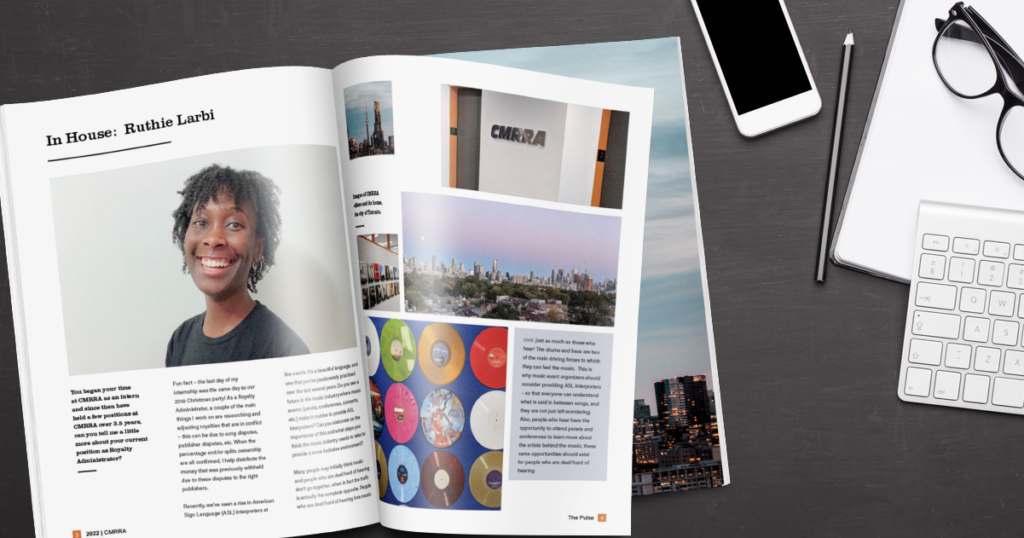Ruthie Larbi, a Royalty Administrator in CMRRA’s distribution team, shared with us details about her work at CMRRA, the importance of American Sign Language (ASL) interpreters at music events, and recalls strong Black music industry professionals that have inspired her throughout her career in this month’s featured In House article.

You began your time at CMRRA as an intern and since then have held a few positions at CMRRA over 3.5 years, tell me a little more about your current position as Royalty Administrator.
Fun fact – the last day of my internship was the same day as our 2018 Christmas party! As a Royalty Administrator, a couple of the main things I work on are researching and adjusting royalties that are in conflict – this can be due to song disputes, publisher disputes, etc. When the percentage and/or splits ownership are all confirmed, I help distribute the money that was previously withheld due to these disputes to the right publishers.
Recently, we’ve seen a rise in American Sign Language (ASL) interpreters at live events. It’s a beautiful language, and one that you’ve passionately practiced over the last several years. Do you see a future in the music industry where music events (panels, conferences, concerts, etc.) make it routine to provide ASL interpreters?
Many people may initially think music and people who are deaf/hard of hearing don’t go together, when, in fact, the truth is actually the complete opposite. People who are deaf/hard of hearing love music just as much as those who hear! The drums and bass are two of the main driving forces to which they can feel the music. This is why music event organizers should consider providing ASL interpreters – so that everyone can understand what is said in between songs, and they are not just left wondering. Also, people who hear have the opportunity to attend panels and conferences to learn more about the artists behind the music; these same opportunities should exist for people who are deaf/hard of hearing.
One step to providing a more inclusive environment could be to enable partnerships with Deaf Ontario or the Canadian Association of the Deaf with live event organizers in order to provide ASL interpreters. Promoters already have to follow certain rules and requirements to ensure that their events can happen. Adding a requirement in contracts for an ASL interpreter to participate, whether or not people who are deaf/hard of hearing are there, would be amazing. I find that most people are mesmerized by the language, which entices some people to learn more. This is exactly how and why I started learning ASL!
On the topic of inclusivity, this month is Black History Month! Black history plays an integral part in the development of the music industry. Who are some of the more influential Black music industry professionals that you’ve encountered so far in the music industry? Has their work inspired you?
The most influential Black music industry professional that I have encountered is Karen Burke. She is a music professor at York University (in my opinion, one of the best!) and I had the opportunity to be in almost all of her classes, including Gospel Choir, the History of Gospel Music, and Vocal Music Education. Karen has taught me so much in and out of the classroom. However, watching her thrive in Canada as a music professional, hosting various events and even travelling with her Gospel choir internationally has been such a treat. She is one of the most talented and kindest humans on earth.
Because of Karen, I also had the opportunity to see Jonathan McReynolds a few years back at a concert here in Toronto. The way his majestic voice carries various stories portrayed through lyrics has encouraged me as a songwriter and artist.
Tye Tribbett is another professional who made his way up to Toronto with a full band and his energetic personality for a New Year’s celebration some years ago. His music challenges me to think outside of the typical “chord progression” box and to have fun while doing it!
The global pandemic has forced the music industry to evolve and adapt quickly. How do you feel this is going to affect and evolve mechanical licensing 5 years from now?
With the rise of social media and as more artists begin to learn about mechanical licensing, I believe it will bring a more dynamic and wholistic approach to the music industry. Yes, performing artists may mainly focus on the creative side, but knowing how to get paid for your music through various lines of business can shine a brighter light on the mechanical licensing side of the industry.
Thinking about becoming a client of CMRRA? Already a client but you have questions? Email us at inquiries@cmrra.ca and we’ll get you the answers you need.


